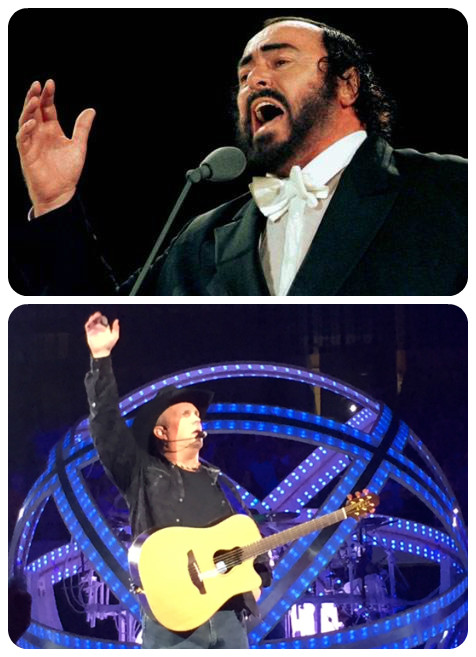The late Luciano Pavarotti holds the Guiness World Record for the most curtain calls by a singer or actor – a staggering 165. Together with Placido Domingo and Jose Carreras, he sang in the biggest-selling classical record of all time.
When Pavarotti sang, no one sang along. They would sit breathlessly, passively, allowing themselves to be carried away by the extraordinary power of the tenor’s voice.
“Excellent” hardly conveys the talent the world lost on September 6, 2007.
Garth Brooks is the greatest-selling albums artist in the U.S. since 1991 and the second-best-selling solo artist of all time in the U.S. His concerts literally sell out in 15 minutes. And when he takes the stage he takes his audience with him.
When Garth Brooks sings, if you don’t sing along you look a little strange. Take it from experience, if you don’t know all the words you’ll act like you do.
Excellent? Oh my yes, in a completely different way.
There is an excellence that leaves you speechless – or song-less. The artist is the artist and the audience is an audience in the truest sense of the word. The stage forms in invisible barrier between the have(s) and the have-nots – between the practitioner and the posers. The audience appreciates – even celebrates or adores – the artist. But they also know their place.
There is another excellence that invites you in. The artist-in-chief connects with the artists-in-residence and everybody raises the roof. The stage forms an invisible bond between a house full of singers. The audience feels – and celebrates being – part of a vast, ageless family reunion.
In every endeavor, every field, every industry that distinguishes between futility, mediocrity and excellence, you will need to decide what kind of excellence is called for. Do you want to blow people away and leave them in awe? You can do that, given the right amount of development and the right design of your “show.”
But if you want them to sing along, you have to meet them where they are. Become one of them and one with them. You have to tap into more than just industry or artistic standards – you must tap into the hearts of those who hear your song… even if the “song” is computer code or accounting.
In short, your “song” must be singable by in-the-shower concert artists and car radio divas.
In the Berlin Conference on Evangelism in 1966, sponsored by the Billy Graham Evangelistic Association, an American theologian presented a deep and involved academic paper. Many of the Christians really had no clue what he was talking about. That included an African man, dressed in his native dress, who had not been able to make out a thing that the learned professor said. But he went right up and hugged the speaker and kissed him in front of everybody. And he said, “You know, I don’t understand a thing you say, but I’m so glad that a man who knows as much as you know is on our side!”
Billy Graham himself told that story. I have no clue who the theologian was; I’m sure he was excellent in his field. But I quote the African man all the time. That’s excellence I can relate to.
Before you pursue excellence for yourself or your field, you may need to define how you want that excellence to be recognized – and responded to. If excellence is defined as ovations and adoration, then separate yourself from your audience and blow them away. But if excellence is defined in terms of uniting together in song or followership or creating a movement, you will need to find a way to join yourself with your audience and carry them with you.
The purists may not be impressed, Elvis. But if the rest of the world sings with you, they’ll probably drown out the critics anyway.
